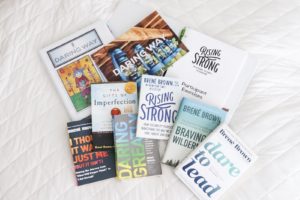I remember watching the video of Madison Holleran’s story through tear-filled eyes on the bed in my San Francisco hotel room.
It was June 2015. I was there for a work trip and during a dinner discussion about social media, a colleague asked if I’d heard the news.
Little Miss Fearless: It’s Still Ok To Not Be Ok
I remember watching the video of Madison Holleran’s story through tear-filled eyes on the bed in my San Francisco hotel room. It was June 2015. I was there for a work trip and during a dinner discussion about social media, a colleague asked if I’d heard the news. The words beautiful, student-athlete, and Instagram were enough to pique my interest. I had been silently struggling with perfectionism for years–in large part due to the pressure I felt from fashion blogging and social media–but couldn’t quite put a label on it. Reading Maddy’s story, I felt understood. Validated. Instead of feeling ashamed of my struggle, I felt hope.
My blog, Little Miss Fearless, began in 2012. I value courage, I like fashion, and blogging about them is outside my comfort zone. But six months in, the pressure I put on myself to be perfect on social media was starting to affect my mental health. Instagram was my biggest arena. I constantly struggled to balance looking perfect and being courageous. It drove me further down the path to depression, anxiety, food addiction and life-paralysis.
Brene Brown explains life-paralysis as referring to “all of the opportunities we miss because we’re too afraid to put anything out in the world that could be imperfect.” I wanted to be brave, to own my imperfections. But I was so so afraid.
Getting Help
Shortly after my first baby was born in 2016, I discovered “The Gifts of Imperfection” by Brene Brown. For the next year and a half I watched, read and studied everything I could find on perfectionism and courage. Again, I felt validated. But I still needed help. My attempts to (perfectly) juggle the demands of motherhood, a full-time job and my blog without dropping any balls had pushed me further into depression. I was overwhelmed and having suicidal thoughts. Desperate to silence my gremlins, I searched for therapists certified in Brene’s work and scheduled my first visit in September 2017. My therapist met with me weekly for the next five months and I participated in her group therapy classes centered on Brene’s curriculum. Everything I was learning and applying was life changing.
Real Problems
I found my courage and started exposing the lies of perfectionism on my blog and Instagram. For the first time, I felt purpose in my struggle. By opening up, I hoped to help others avoid the pain I experienced. And then it happened. Someone left a cynical comment on my Instagram post. “Find people with real problems,” she said. (I’ll spare you the rest of it.) I instantly went into shame. And my perfectionist gremlin crawled out of the shadows to tell me, “I told you so. If you would have just been perfect, this wouldn’t have happened.” I felt small and hurt. I knew this person wasn’t seeing the whole picture of who I am and where I’ve been. And I remembered that, on social media, we’re all guilty of this. “It’s ok,” I told myself. “It’s ok to not be ok.” For the next year, I continued to battle my perfectionist gremlins in my blogging and Instagram arenas. After my second baby was born this summer, I was reading some new blog comments that came in during my time off. And it happened again. “Your manicured ‘perfected’ photos completely undermine your supposed message of being ok with imperfection. If you’re truly ok with it, why not show yourself raw, unedited, unfiltered? Be real and actually live your message.” Shamed. Again.
Faith Over Fear
Recovering from perfectionism for me has meant that even when I’m making progress, and I’m letting go of old thought patterns and unrealistic expectations, and I feel like I’m on the right path, there will always be something or someone reminding me that I didn’t get it “just right.” But as Brene so eloquently said, “Courage is telling our story, not being immune to criticism.” And if I’ve learned anything from this struggle, it’s that not trying to control others’ perceptions of me makes me extremely uncomfortable. That is when I turn to God. And I’m not even perfect at doing that. But I’ve seen His hand in my life enough to know that He’s real, He loves me, and He wants to help me overcome this. It’s vulnerable to share our stories, our mistakes, and to let our imperfections be seen–in real life and online. Vulnerability is uncomfortable. That is why it’s brave. And we don’t have to brave it alone. I find the courage to keep showing up every time I lean into my faith. It takes constant practice. It doesn’t come naturally to me. But I keep telling myself, “It’s ok.” “It’s still ok to not be ok.” Each time that I feel shame for not being perfect, for not getting it just right, for not being ok–especially when I feel like I should “know better” because of everything I’ve learned–I’ll just keep trying. I’ll dig deep and choose courage. I’ll let go and let God. “So Jesus said to them, ‘Because of your unbelief; for assuredly, I say unto you, if you have faith as a mustard seed, you will say to this mountain, ‘Move from here to there,’ and it will move; and nothing will be impossible for you.” (Matthew 17:20) I value courage. I believe it’s contagious. And blogging about it makes me feel brave.
—
Thank you Amanda for sharing! If you’d like to share a story, contact MHF any way you’d like.






